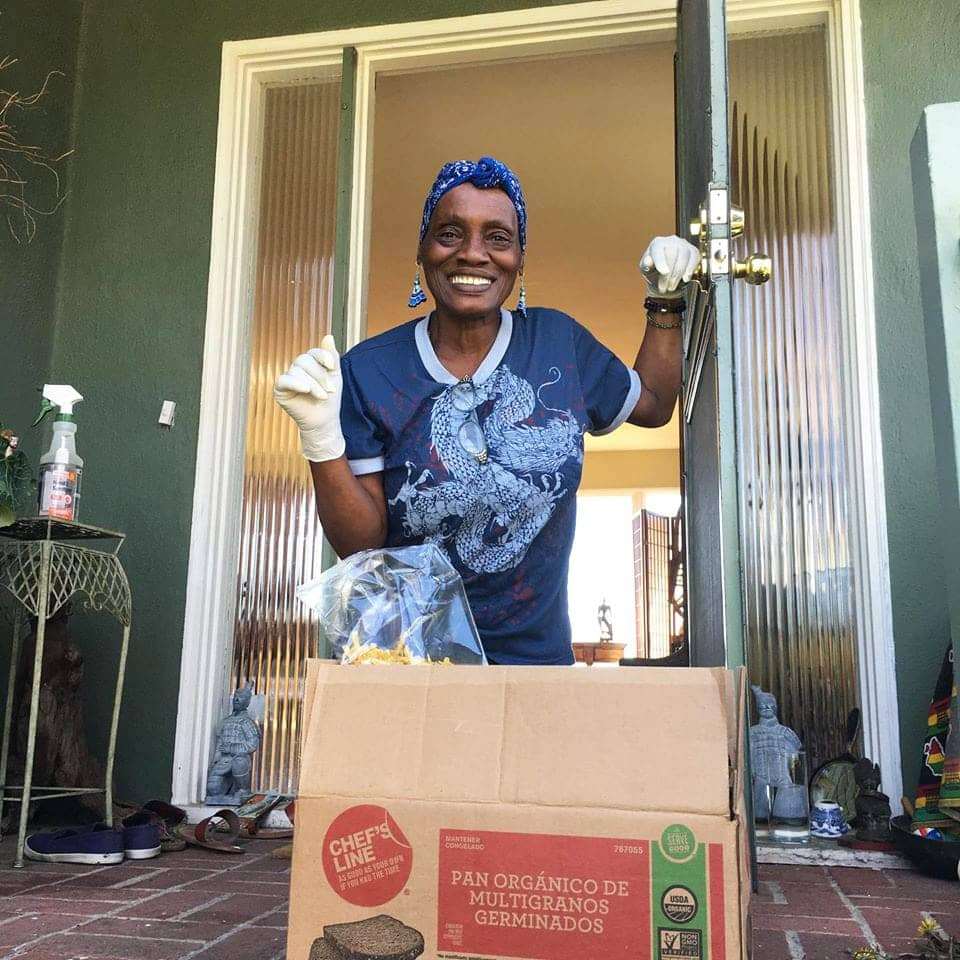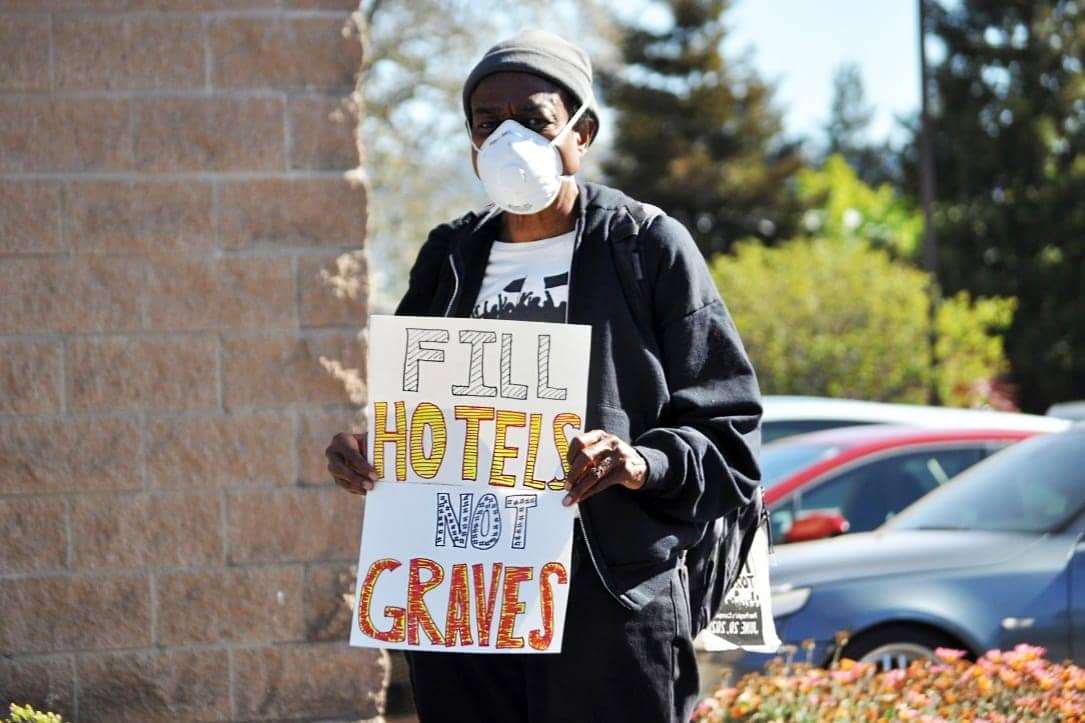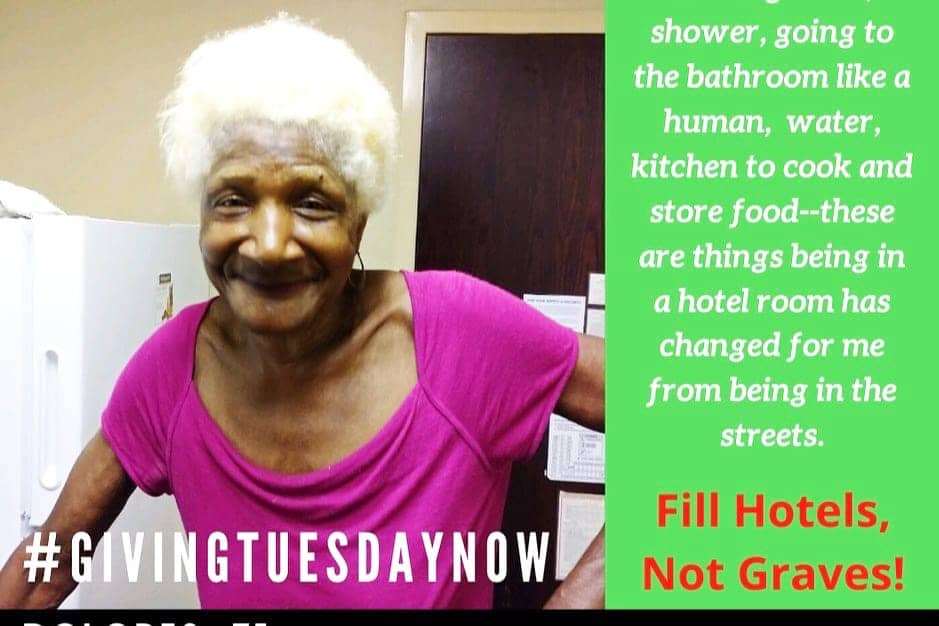
by JR Valrey, The Black New World Journalist Society
Candice Elder, founder and executive director of the East Oakland Collective, is a force to reckon with in Oakland when the issue of homelessness is brought up. During this quarantine season, her comrades as well as herself have successfully organized a moratorium on the police sweeping of homeless encampments in Oakland, which was passed unanimously by the City Council.
In the media, city government has heavily promoted Project Room Key, which is a program where the City of Oakland is supposedly working to house the most vulnerable of the homeless population in the hotels and motels on Hegenberger Boulevard to protect them from COVID-19.
While many wonder if Project Room Key is a propaganda stunt that the City government is using to look engaged in the fight against COVID, the East Oakland Collective has organized their own fund, and is currently engaged in putting homeless families in hotels without government assistance.
Some people make waves while others ride them. Candice is definitely someone in the city of Oakland who makes things happen, while others follow the trends that she sets. I wanted to talk with Candice so that we could have a real candid discussion on what the city of Oakland is or isn’t doing for its residents during the COVID-19 pandemic quarantine.
Some people make waves while others ride them. Candice is definitely someone in the city of Oakland who makes things happen, while others follow the trends that she sets.
M.O.I. JR: How and when was the East Oakland Collective founded? For what purpose?
Candice: EOC was founded in January 2016 for the purpose of advancing racial and economic equity work in deep East Oakland. Giving a voice and cultivating leadership of young Black residents and getting ahead of the curve of looming gentrification. EOC rapidly grew to focus on civic engagement and leadership, economic empowerment and homeless services and solutions.
M.O.I. JR: Since the COVID pandemic started, has the police harassment of the homeless and the destruction of encampments decreased in Oakland or increased?
Candice: EOC serves on the steering committee of the Homeless Advocacy Working Group (HAWG) and, at the beginning of the pandemic, we worked with the City of Oakland administration to stop encampment sweeps. Then we worked with City of Oakland Council President Rebecca Kaplan to draft a moratorium on encampment sweeps during the pandemic, which was unanimously passed by the City Council.
Police always harass and target unhoused people and encampments. Some of the most targeted encampments are in East Oakland. We have not seen an increase in criminalization of the unhoused, likely due to the moratorium on sweeps and law enforcement being encouraged to cite and not arrest to not overcrowd the jails. We have seen some encampments grow slightly due to the early release of our incarcerated brothers and sisters from jail and prison.
M.O.I. JR: How are homeless people dealing with the pandemic? Is the city of Oakland offering any considerable help?
The point-in-time count reports over 4,000 persons unhoused in Oakland . . . that number (is) closer to 10,000, according to data from Alameda County Healthcare for the Homeless.
Candice: Our unhoused brothers and sisters are experiencing increased hardship because of the pandemic. Food insecurity has deepened, there’s lack of access to sanitation (portable toilets, hand washing stations) and supplies (gloves, masks, hand sanitizer), and there’s lack of access to odd and gig jobs. Our unhoused neighbors cannot properly protect themselves against COVID-19 if they do not have access to restrooms, in particular sinks to wash their hands.
People have lost income because their jobs have closed, recycling centers are closed, etc. With panic buying and rations on key essential items, people cannot use their SNAP or EBT benefits to purchase the appropriate amount of water, food and supplies for their families. Our unhoused brothers and sisters rely heavily on food donations and since most people are sheltering in place, food insecurity has increased.
The City of Oakland, County of Alameda and the State of California have all been slow to respond to the crisis of the impact of COVID-19 on the unhoused population. Whereas the City of Oakland has increased the number of sanitation units on the streets, the County of Alameda contracted with hotels to provide emergency shelter, and the governor deployed funds across the state, the response efforts were slow due to bureaucratic red tape and not scaled to address the needs of the many people who are unsheltered on the streets.
M.O.I. JR: What has Libby Schaaf’s response been to protecting the homeless in Oakland against the virus?
Candice: The point-in-time count reports over 4,000 persons unhoused in Oakland. Community advocates believe that number to be closer to 10,000, according to data from Alameda County Healthcare for the Homeless. Mayor Libby Schaaf has prioritized getting the 45 FEMA trailers deployed by Gov. Newsom online – not meeting the large demand of the many unhoused individuals and families who need emergency shelter and permanent housing.
The City of Oakland and County of Alameda is working with both contracted and volunteer outreach agencies to provide sanitation supplies for distribution.

M.O.I. JR: Are the homeless being let inside of the hotels on Hegenberger? What’s the process for a homeless person to get a room?
Candice: More info about Project Room Key and the two current hotels near the Oakland Airport (Comfort Inn and Radison) for safe housing (unhoused from the most vulnerable subgroups) or isolation (positive COVID-19 cases that are symptomatic and awaiting test results) shelter can be found at https://www.achch.org/isolation-housing.html.
M.O.I. JR: Is East Oakland Collective doing community food giveaways? Do y’all give away hygiene packs? Do y’all give away COVID preparedness packs? What days and where?
Candice: EOC’s work has dramatically intensified and expanded to address the food insecurity and essential needs of Oakland’s most vulnerable populations during this time: the unhoused, seniors, disabled, low income families of color, and those with compromised immune systems. EOC’s office in the heart of East Oakland has become a resource hub for the community.
We offer freshly prepared meals, non-perishable food bags, household supplies, hygiene and sanitation kits, including gloves, masks, hand sanitizer and more. Pickup is available Monday, Tuesday and Thursday, 3-4 p.m., each week. We deliver food and supplies to encampments across Oakland. Front door delivery service is available for those who do not have transportation and/or are senior or disabled.
M.O.I. JR: Are there any other resources that we may not have talked about that you would like to share with the community?
Candice: EOC is partnering with The Village Oakland and Love and Justice in the Streets to put our unhoused seniors and families into hotel rooms. Whereas the government has been slow to meet the total need of all unhoused persons in Oakland, we are not waiting!

Go to https://www.gofundme.com/f/hotels-not-graves. We currently have over 20 seniors and families in hotel rooms in West and East Oakland – with the hope to bring in more folks who need to shelter in place and get a reprieve from living on the streets.
M.O.I. JR: How do people keep up with the East Oakland Collective’s work online?
Candice: Our website is www.eastoaklandcollective.com.
Facebook: https://www.facebook.com/eoakcollective/
Instagram: @eastoaklandcollective
Twitter: @eoakcollective
M.O.I. JR: If people would like to support or donate to the East Oakland Collective, how do they do that?
Candice: Make a tax deductible donation to the East Oakland Collective.
Use the Amazon wish list to purchase food and essential supplies for the unhoused.
Donate a meal and supply kit for a family in need.
Donate to fill hotels, not graves.
The People’s Minister of Information JR Valrey, journalist, author and filmmaker, can be reached at blockreportradio@gmail.com or on Facebook. Visit www.youtube.com/blockreporttv. All stories written about COVID-19 were partially made possible by the Akonadi Fund #SoLoveCanWin.





